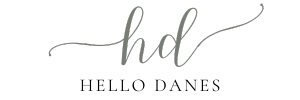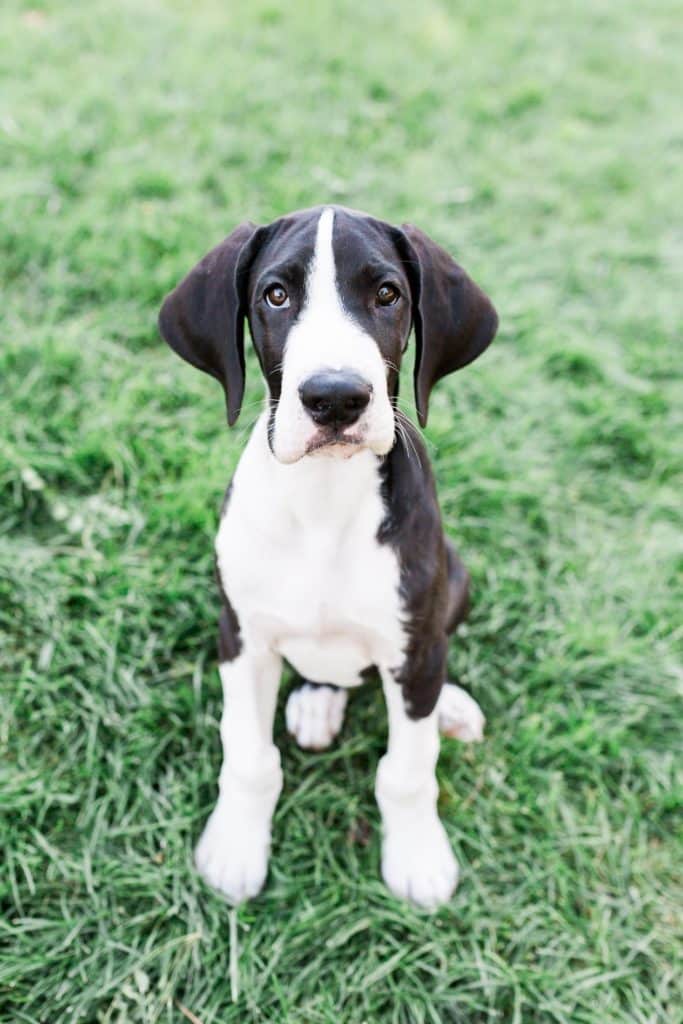Choosing the right food for a Great Dane sometimes feels like rocket science. We get it because we’ve been there. Selecting the right food for your Great Dane is crucial for maintaining its health and well-being, so this is important! Our Great Dane Dog Food 101 post cuts through the fluff and gives you the best and most up-to-date answer.
This post covers several Great Dane food topics including:
- How much dog food does a Great Dane need?
- What is the best food for Great Danes?
- Is Grain-free food good for dogs?
- Should pet owners be feeding large breed puppies puppy food or adult food?
- What does a senior dog need to be eating?
Let’s dive into the best dog food as well as get answers to other commonly asked questions.
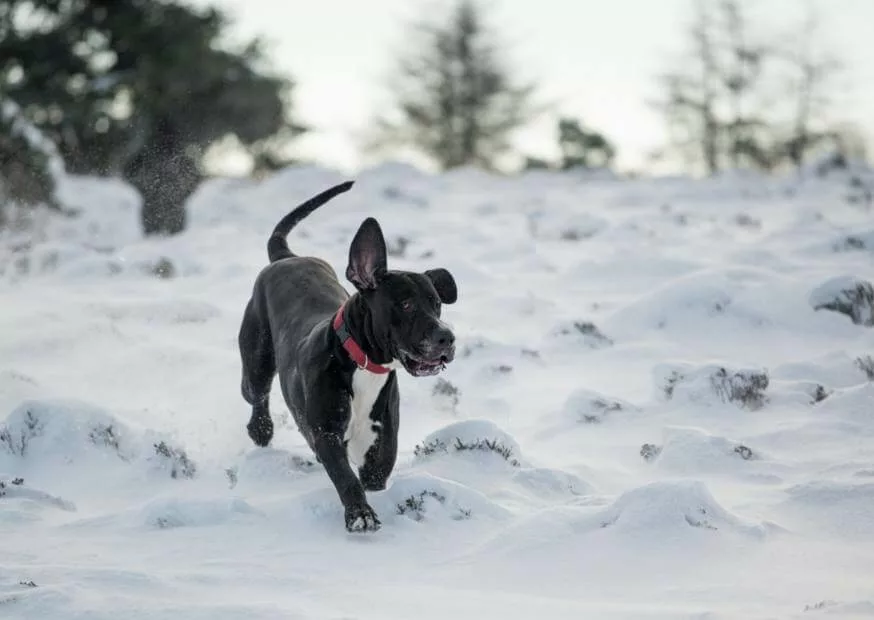
Great Dane Dog Food Nutritional Requirements
Giant breed dogs, such as Great Danes, possess distinct nutritional needs due to their size, growth rate, and physiological characteristics. The sheer magnitude of their bodies requires careful attention to nutrient levels to support healthy bone development and prevent musculoskeletal issues.
It is well-studied, for example, that excess calcium is damaging to growing bones. Giant breeds undergo rapid growth during their puppy stage, making their nutritional requirements specific to this critical phase.
Additionally, their slower metabolism and susceptibility to health conditions necessitate controlled calorie intake and a balanced diet to avoid obesity-related complications.
Here is our shortlist of requirements. Check each one of these items to narrow down your choices!
- Calcium level of 1.0 – 1.3%, ideally less than 1.2%
- 3.5g or less of calcium per 1000kCal
- For puppies under the age of two: AAFCO Large Breed Growth Statement
- Formulated for large or giant breed dogs
- Grain inclusive (never feed grain-free dry kibble, more on this below)
- Ideally formulated by a company with a board-certified Veterinary Nutritionist on staff, that does feeding trials and nutritional research
If you are unsure whether your dog’s food meets these requirements, check out the search tool at the Giant Dog Food Project, which outlines that information for over 700 formulas.
At Hello Danes, we researched this for you and recommend the following formulas (for your convenience). All of these meet the current science-backed recommendations:
For Adults Over the Age of 2:
- Purina Pro Plan Sensitive Skin and Stomach Large Breed (Salmon based, chicken free)
- Purina Pro Plan Large Breed Shredded Chicken & Rice (Large Pieces & Chicken Shreds!)
- Purina Pro Plan Large Breed Weight Management (Get the weight off)
- Purina Pro Plan Large Breed Bright Mind Age 7+ (for Senior Great Danes)
- Purina Pro Plan Giant Breed (Hard to find, might be discontinued)
- Royal Canin Giant Breed (Amazing for dogs with chronic loose stools, TOP TIER)
- Eukanuba Large Breed (Great for active and sport dogs)
- Purina One Smart Blend Large Breed (Fantastic budget-friendly option)
- Hill’s Science Diet Large Breed Beef & Rice
- Purina Pro Plan 30/20 Sport Beef & Bison
For Puppies Under the Age of 2:
- Purina Pro Plan Large Breed Puppy – any flavor!
- Purina Pro Plan Sensitive Skin & Stomach Large Breed puppy – TOP PICK, salmon-based
- Eukanuba Large Breed Puppy (Great for active and sporting dogs)
- Purina One Large Breed Puppy (Excellent budget option)
- Hill’s Science Diet Puppy Large Breed
- Royal Canin Giant Puppy Dry Dog food (to age 12 months) – TOP PICK, PREMIUM OPTION
- Royal Canin Giant Junior Dry Dog food (8-24 months)
- Purina Large Breed Puppy Chow
Check out THE GIANT DOG FOOD PROJECT where you can compare brands and values head-to-head.
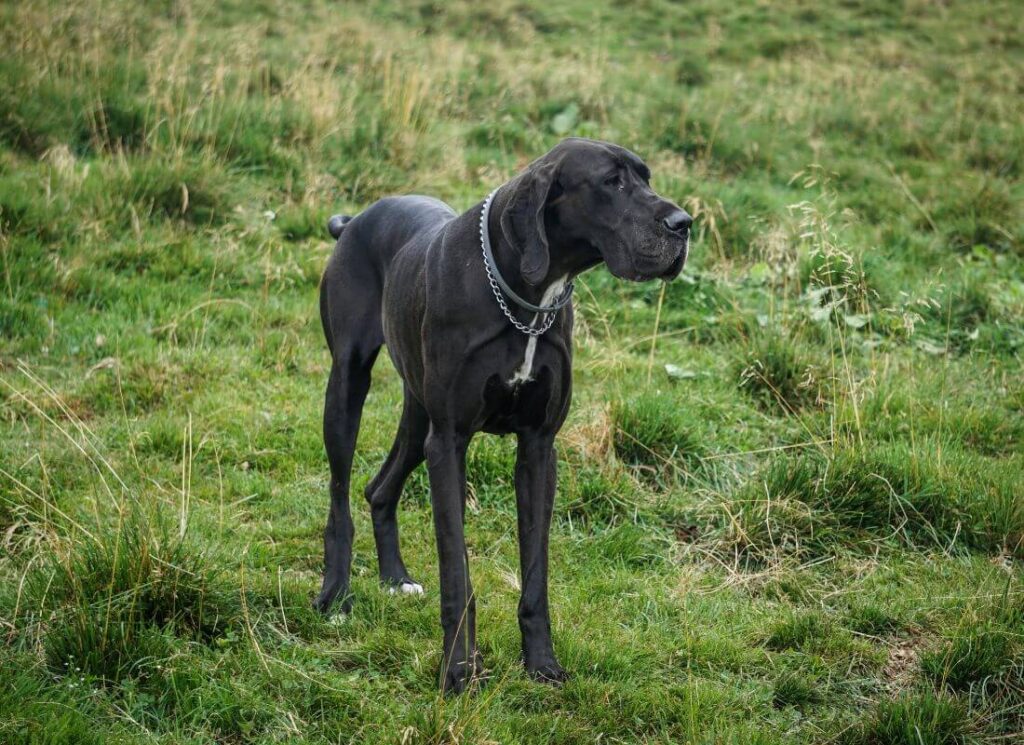
How Much Food Do Great Danes Eat?
Determining the appropriate amount of food for Great Danes requires a balanced approach, taking into account their size, age, activity level, and individual metabolism. The food you choose matters, too.
Generally, adult Great Danes may consume between 2,500 to 3,500 calories per day, but this can vary. Puppies, during their rapid growth phase, may require up to twice the amount of calories compared to adult dogs!
It’s crucial to follow feeding guidelines provided by reputable dog food brands and to monitor the dog’s weight and condition regularly.
Feeding too much to puppies can contribute to orthopedic growth disorders, and feeding too much to adults can contribute to obesity-related health problems.
Splitting their daily food intake into multiple meals helps prevent bloating, a common concern in large breeds.
Consulting with a veterinarian to tailor the diet to the dog’s specific needs and adjusting portion sizes based on age and activity level is key to maintaining optimal health and weight in Great Danes.
I’ve seen puppies eat 6-12 cups/day, while adults may eat only 3-7 cups, depending on the nutrient density of the food.
Author’s Note: The outdated practice of feeding adult food to Great Dane puppies is NOT recommended. It often results in above-average food intake, because the puppy is starved for protein and nutrients. Read more about this HERE.
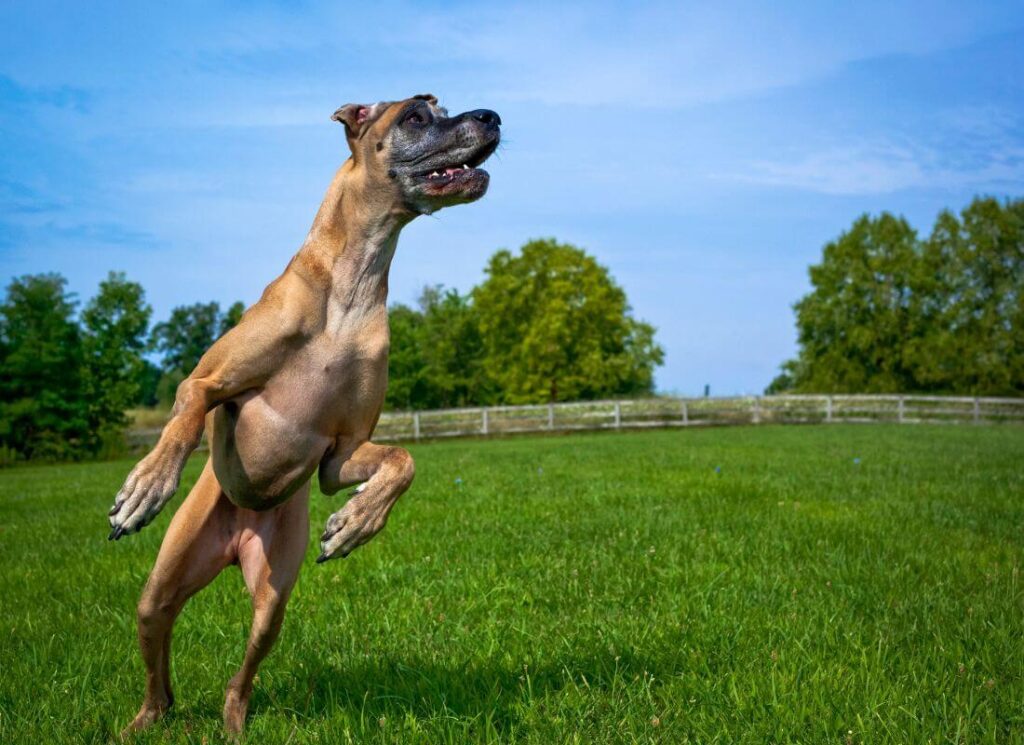
Never Overfeed a Great Dane
More is not always better when it comes to feeding your dog. Overfeeding can lead to health problems like obesity and digestive issues.
Great Dane puppies that are fed too much will grow too quickly, putting them at risk for developmental orthopedic conditions such as Panosteitis, HOD, OCD, and Carpal Laxity.
In many cases, chronic loose stools can be attributed to excess intake of food! Cutting back is a healthy choice.
- Accelerated Growth: Overfeeding can lead to rapid growth in puppies, contributing to musculoskeletal issues and joint problems.
- Obesity: Overfeeding contributes to obesity, placing extra stress on joints and exacerbating existing health concerns.
- Digestive Issues: Consuming more food than necessary can lead to digestive problems, including indigestion and diarrhea.
- Reduced Lifespan: Overweight dogs are more prone to various health issues, potentially reducing their lifespan.
In adult dogs, overfeeding increases the risk of many conditions, including surgical complications. For overweight dogs that get Osteosarcoma, life-saving amputation surgery may not be an option.
Many people are tempted to feed their Great Danes too much food out of concern that they are too thin! They are rarely undernourished.
For dogs that refuse food and lose weight doing so, a medical emergency is indicated. This is not a sign to add fatty foods to the diet.
Here are some common health problems associated with excess weight in adult dogs:
- Arthritis: Overfeeding can contribute to excessive weight gain, placing additional stress on the joints and increasing the likelihood of developing arthritis in dogs.
- Joint Problems: Excessive weight can lead to joint issues, including hip dysplasia and elbow dysplasia, affecting the dog’s mobility and comfort.
- Cardiovascular Conditions: Overweight dogs are at a higher risk of developing cardiovascular problems, such as heart disease and hypertension.
- Respiratory Issues: Obesity can strain the respiratory system, leading to difficulties in breathing and increased susceptibility to respiratory infections.
- Reduced Immune Function: Excessive weight can compromise the immune system, making dogs more susceptible to infections and illnesses.
- Liver Disease: Overfeeding may contribute to the development of liver problems, impacting the organ’s function and overall health.
- Decreased Quality of Life: Dogs that are overfed and overweight may experience a reduced quality of life due to limited mobility, discomfort, and increased vulnerability to various health issues.
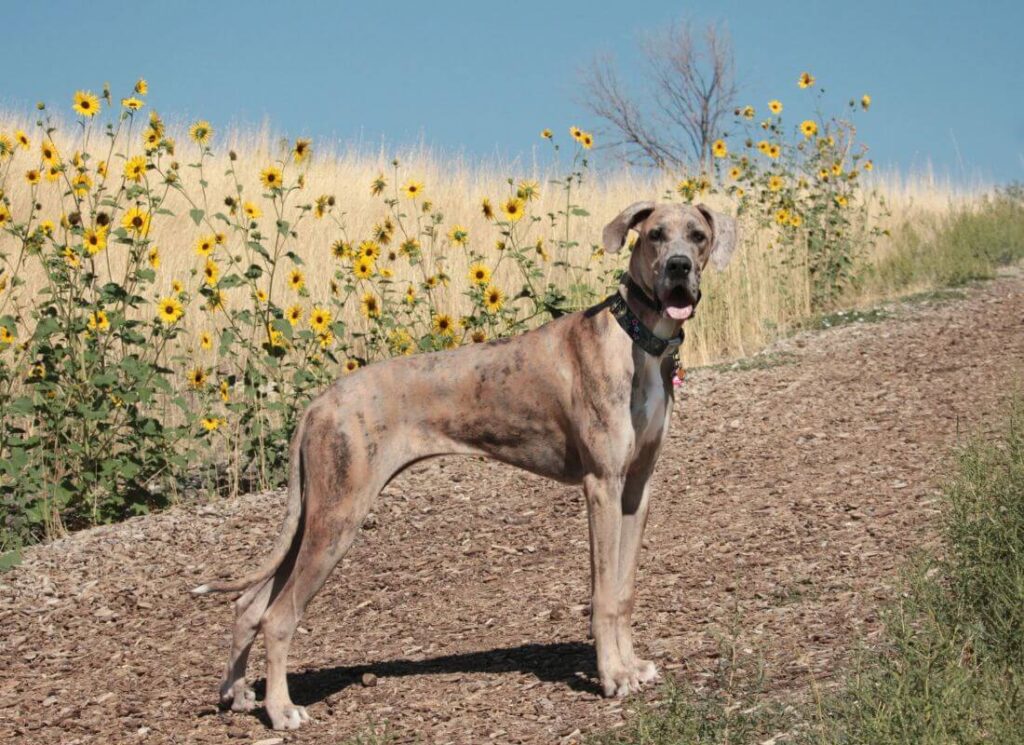
Can Great Danes Eat Grain-Free Food?
In recent years, concerns have been raised about a potential link between certain grain-free diets and a serious heart condition called dilated cardiomyopathy (DCM). While not exclusive to Great Danes, this breed, like others, may be susceptible to DCM if their diet lacks proper nutrients.
DCM is a condition where the heart becomes enlarged and weakened, affecting its ability to pump blood efficiently.
Several studies have suggested a likely connection between grain-free or boutique diets and an increased risk of DCM. In some cases, the condition is reversed with a diet change, indicating substantial theories that diet does indeed play a huge role in heart health (just as it does in humans!).
Of course, this is a controversial issue filled with many opinions, including those of influencers who will lose profits and credibility if the DCM-Nutrition link is proven beyond any reasonable doubt. (Read about Dr. Judy Morgan and her inflammatory commentary on this topic HERE).
Why Is Grain-Free Food Popular?
Many holistic veterinarians and influencers promote that grain-free foods “have more meat and fewer carbs and fillers”. They also believe that removing grains from the diet can help resolve allergies, itching, and digestive issues.
This is an absolute myth. At least, the part about having “more meat and less carbs”, is. Grain-free dry diets are loaded with carbs in the form of lentils, potatoes, peas, and other legumes…not more meat as marketing has led us to believe.
Most veterinarians advise against grain-free diets and encourage pet owners to choose instead research-backed dog food brands that meet WSAVA recommendations. You can read more about that HERE.
In our popular Great Dane group on Facebook, several members have come forward to tell us their stories of losing (or nearly losing) their beloved Great Danes to heart disease after feeding them grain-free foods. Until we have more information, it’s just not worth the (very real) risk.
If you have a Great Dane suffering from an unhealthy gut, allergies, and itching, perhaps a trip to a veterinary dermatologist or veterinary internist is in order. They have other treatment options that will be ultimately safer and more effective.
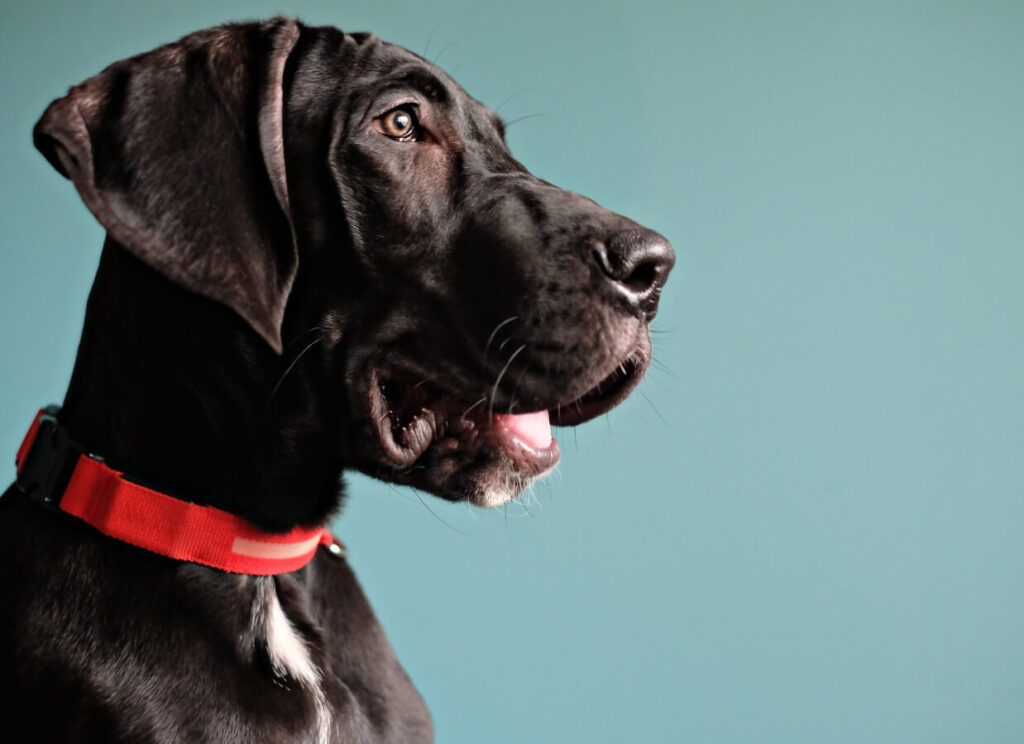
Feeding Guidelines for Great Dane Puppies
You cannot feed a Great Dane Puppy the same way that you feed an adult dog. Great Dane puppies must have a diet with strictly controlled calcium, phosphorus, vitamin, mineral, and energy levels.
Here are some general feeding guidelines to ensure the healthy development of your Great Dane puppy:
- Large or Giant Breed Puppy Food: Choose a puppy food specially formulated for large breeds. Look for options that specify “large breed” or “giant breed” on the packaging, as these diets typically address the specific nutritional requirements of growing Great Danes.
- AAFCO Large Breed Growth Statement: The food must have 1.2% or less calcium AND the AAFCO Large Breed Growth Statement to be appropriate. Do NOT feed adult food to Great Dane puppies (this is an outdated practice not supported by science).
- Balanced Calcium and Phosphorus: Ensure the puppy food has a balanced ratio of calcium to phosphorus, typically ranging from 1:1 to 1.2:1. This helps support proper bone development and minimizes the risk of skeletal issues.
- Caloric Intake: Great Dane puppies have a high metabolism, but it’s crucial not to overfeed. Follow the feeding guidelines on the food packaging, but individualize portions based on your puppy’s age, weight, and activity level. Regularly monitor their weight and adjust portions as needed.
- Meal Frequency: Feed young Great Dane puppies three to four meals per day to accommodate their fast growth and reduce the risk of bloat. As they mature, you can gradually transition to two meals per day.
- Avoid Rapid Growth: While it’s essential to support growth, avoid overfeeding to prevent excessively rapid growth. This helps reduce the risk of musculoskeletal issues, including hip dysplasia.
- Treats and Table Scraps: Limit treats and table scraps, as excessive treats can contribute to weight gain. Too many goodies will unbalance the diet and encourage picky eating.
- Regular Veterinary Check-ups: Schedule regular check-ups with your veterinarian to monitor your Great Dane’s growth and ensure they are meeting developmental milestones. Your vet can provide guidance on adjusting the diet as needed.
Here is our list of foods that meet all recommendations for Great Dane puppies. They need to stay on an appropriate formula until age 2. This is the most current recommendation (2023-2024).
- Purina Pro Plan Large Breed Puppy – any flavor!
- Purina Pro Plan Sensitive Skin & Stomach Large Breed puppy – TOP PICK, salmon-based
- Eukanuba Large Breed Puppy (Great for active and sporting dogs)
- Purina One Large Breed Puppy (Excellent budget option)
- Hill’s Science Diet Puppy Large Breed
- Royal Canin Giant Puppy Dry Dog food (to age 12 months) – TOP PICK, PREMIUM OPTION
- Royal Canin Giant Junior Dry Dog food (8-24 months)
- Purina Large Breed Puppy Chow
Check out THE GIANT DOG FOOD PROJECT to compare brands and values.

Supplements for Great Danes
Navigating the world of supplements for Great Danes is like walking into a Jungle! There are so many options and a lot of companies trying to get our money. The supplement industry is largely unregulated!
It’s easy for companies to bring new-fangled options to market. All they have to do is pay a factory to manufacture their products and package them with a well-designed label.
The truth is that many supplements are not proven, not researched, not carefully manufactured, and may do more harm than good.
When considering supplements for your Great Dane, stick to brands that are both veterinary recommended and/or have the NASC Seal (which is obtained by proving the safety and potency of the formula being sold).
Never give a multivitamin or multi-supplement. If your pet’s diet is properly balanced, a vitamin or mineral supplement may result in excess nutrients such as vitamin D and calcium intake. This can result in a slew of nutritional problems. More is not better!
Here are some supplements you might consider!
The Best Fish Oil for Great Danes
Great Danes are prone to many health conditions. Some include food allergies, skin issues, joint conditions, and digestion problems.
Fish oil is a great way to support large breeds regardless of the dog’s age. It can be given at any life stage, in moderation. Because fish oil is high in fats, it does add a lot of calories to the diet. Watch your pet’s body condition score and don’t let them become overweight!
Buyer beware, not all fish oils are created equal. With any product you choose, you must verify that the company is using exceptional quality control and proving its supplements in clinical and safety trials.
Nutramax Welactin is a great example of a fish oil that is carefully sourced and formulated, manufactured by a company that backs up their promises with clinical research and industry-leading quality control.
Joint Supplements for Big Dogs
There are MANY joint support options on the market, and like the others, it can be hard to choose. Save your money! Don’t even consider ones that don’t have clinical research and owned manufacturing facilities.
We use and recommend Dasaquin and Cosuquin products.
- Cosequin Hip & Joint Chewable Tablets
- Cosequin Omega 3 Hip & Joint Soft Chews
- Dasuquin Hip & Joint Chewable Tablets
- Dasuquin Joint Soft Chews
- Dasuquin Advanced (Veterinary Formula) Chewable Tablets
- Dasuquin Advanced (Veterinary Formula) Soft Chews
Vitamin C for Great Dane Puppies
A lot of Great Dane breeders recommend giving all puppies a lot of vitamin C to “prevent knuckling”.
This practice is not backed by science. Like many home remedies, this is one that may do more harm than good.
See, here is the thing. Puppies DO need vitamin C in their diet. At one time, decades ago, pet food manufacturers didn’t know how to formulate food for giant breed puppies.
As a result of incorrect nutritional levels, big puppies were experiencing all sorts of problems with growth including Carpal Laxity and growing pains. In response, breeders tried all sorts of things!
They tried feeding adult foods to slow growth (you’ve probably heard this outdated and damaging recommendation before!) and adding vitamin C to promote healthy bones and collagen development. These remedies seemed to work, and this advice has stuck around in the giant breed community for decades now.
There is a fair amount of clinical research showing the important role that vitamin C plays in bone growth and stability!
“Overall, vitamin C exerts a positive effect on trabecular bone formation by influencing expression of bone matrix genes in osteoblasts.”
https://www.ncbi.nlm.nih.gov/pmc/articles/PMC4833003/
Now it’s 2023 and modern large and giant breed puppy foods have been formulated correctly to remove dietary influence on bone growth disorders. We no longer have to starve our puppies of nutrition on adult foods to slow their growth.
These new foods also contain the correct amount of vitamin C to support healthy bone and cartilage development. There is not too little, nor is there too much.
Reread the above quote about “influencing [the] expression of bone matrix genes in osteoblasts”. To put this simply, in the context of wanting to SLOW bone growth and prevent the bones from maturing too quickly, we have to consider once again that over-supplementation may be harmful.
I’d also like to point out that too many Great Dane puppies suffer from chronic loose stools. This is a side effect of excess vitamin C.
Don’t blame those loose stools on chicken or grains; look at your supplements, first.
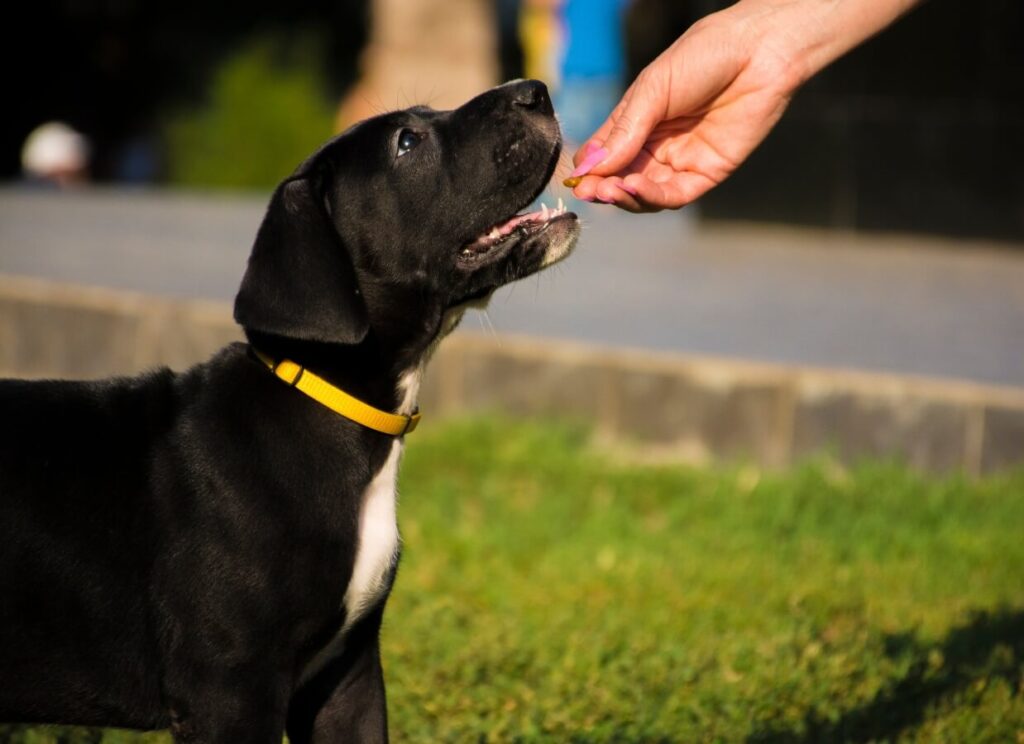
Great Dane Feeding Chart
The numbers on the chart below can vary depending on the food you feed, your dog’s age, their overall health, and their activity level. If your pet receives a lot of additional calories in the form of treats, toppers, enrichment toys, and supplements this chart will be inaccurate.
We recommend offering puppies 3 small meals a day. Transition to 2 meals each day at around 6-8 months of age, if you wish.
This chart is just a guideline of what you can generally expect when feeding a proper diet that meets WSAVA recommendations. Follow the manufacturer’s directions and your veterinarian’s advice. Always monitor body condition, too! Fast growth and excess weight are bad for Great Danes. Err on the side of caution.
Pro Tip: if your dog has loose stools, you may be overfeeding them!
| Age | Timing | Amount |
| Puppies under 12 weeks | 3x/day | 2-4 cups/day |
| Puppies 12-24 weeks old | 3x/day | 3-6 cups/day |
| Puppies 24 + weeks (6 months) or older | 2x/day | 5-10 cups/day |
| Puppies 12-18 months | 2x/day | 6-12 cups/day |
| Adults 18+ Months | 2x/day | 4-8 cups/day |
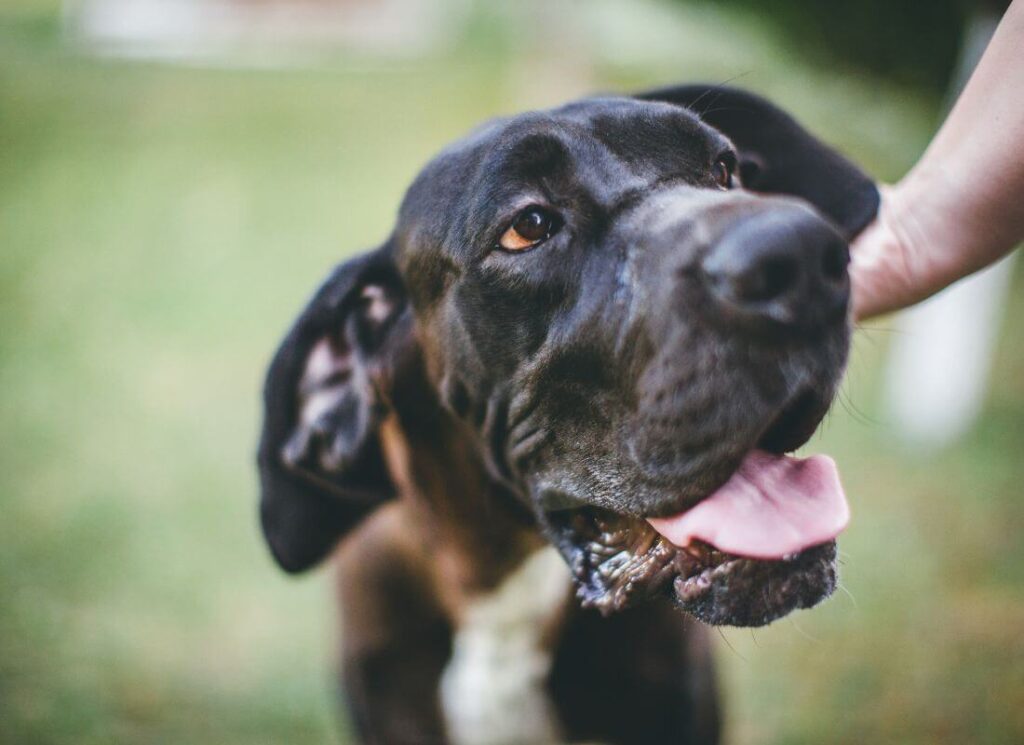
Pet Food Ingredients 101
Distinguishing between fact and fiction is crucial when making informed choices while selecting pet food. Common misconceptions can arise regarding ingredients such as by-products and grains.
A lot of misinformation about pet food is spread by profit-driven influencers and veterinarians who want to drive sales for their books, courses, and supplements.
Not to mention the millions of dollars made by pet food rating websites such as Dog Food Advisor. They earn money every time you click.
Here is some information about pet food ingredients that mirrors what board-certified veterinary nutritionists have to say on the topic!
Chicken Meal and By-Product Meal in Dog Food
Meals (such as chicken meal, beef meal, salmon meal, or chicken by-product meal) in dog food are essentially a concentrated and dehydrated form of meat, excluding moisture content.
When utilized in well-formulated pet foods, meat meals are far superior to ‘fresh meat’ or ‘raw meat’ in terms of nutritional content, protein, and balanced amino acids.
To put this simply, pet food companies that attempt to woo you with “freshly roasted meat” as the primary or only meat ingredient may be making up for the resulting nutritional deficiency in the synthetic vitamins (which are in all pet foods). Some companies have to use more added vitamins than others.
Fresh meat is 80% water and doesn’t have bone, organ, or cartilage in it; these are nutrient-dense and biologically appropriate foods for dogs, even if they don’t sound good to all humans.
Better yet, meat meals have been shown to reduce the risk of canine bloat!
Chicken By-Product meals from companies like Royal Canin are a nutritious and high-quality source of protein that is more similar to a properly formulated raw diet than anything else. If you’ve heard otherwise, you’ve been misled.
I don’t know about you, but I am SICK and tired of predatory influencers that spread misinformation in exchange for profits. Let’s move onward…
Rice & Corn
Rice and corn are commonly included in dog food for several nutritional reasons. While many influencers have disparaged these ingredients, they are desirable when feeding Great Danes!
- Energy Source: Both rice and corn are excellent sources of carbohydrates, providing a readily available energy source. Carbohydrates are crucial for fueling the day-to-day activities and metabolic functions of dogs.
- Digestibility: Rice, in particular, is easily digestible for dogs, making it a suitable option for those with sensitive stomachs. Corn, when processed properly, is also digestible (more digestible than beef, actually) and provides dogs with essential nutrients.
- Fiber Content: These grains contain dietary fiber, which aids in promoting healthy digestion. Adequate fiber in a dog’s diet supports regular bowel movements and helps prevent constipation. It can also reduce the risk of bloat!
- Nutrient Profile: Rice and corn bring a range of essential nutrients to the table, including vitamins, minerals, and antioxidants. These nutrients contribute to overall health and well-being, supporting functions such as immune system maintenance and skin health.
- Cost-Effective: Both rice and corn are cost-effective ingredients, which can contribute to making dog food more affordable without compromising on nutritional value. This affordability allows pet owners to provide their dogs with quality nutrition at a reasonable cost.
- Alternative Protein Source: While not as high in protein as meat, rice, and corn can still contribute to the overall protein content of the diet. This can be beneficial for dogs that may have allergies to certain meat proteins or for pet owners looking to diversify protein sources.
- Gluten-Free Option: Rice is naturally gluten-free, making it a suitable option for dogs with sensitivities or allergies to gluten-containing grains. This provides a grain alternative for dogs with specific dietary requirements.
It’s important to note that the quality of rice and corn in dog food depends on factors such as sourcing, processing, and overall formulation. Responsible pet food manufacturers carefully select and process these ingredients to ensure they meet the nutritional needs of dogs.
Additionally, individual dogs may have unique dietary requirements, so consulting with a veterinarian can help tailor a diet that best suits a particular dog’s health and preferences.
